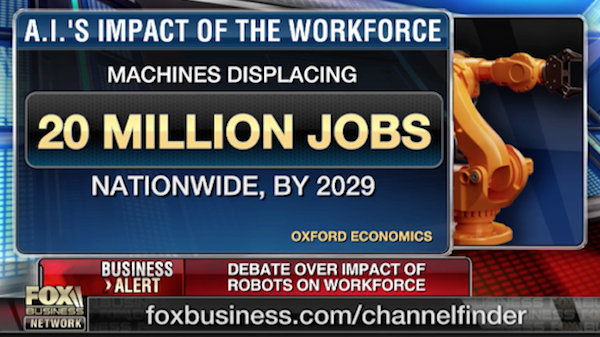The Federal Bank of San Francisco recently sent around a letter asking, Are Workers Losing to Robots?
It turns out that not only are humans being replaced by smart machines, but workers are also getting reduced paychecks even in the booming jobs economy because of automation in the workplace.

The Fed report starts out:
The portion of national income that goes to workers, known as the labor share, has fallen substantially over the past 20 years. Even with strong employment growth in recent years, the labor share has remained at historically low levels. Automation has been an important driving factor. While it has increased labor productivity, the threat of automation has also weakened workers’ bargaining power in wage negotiations and led to stagnant wage growth. Analysis suggests that automation contributed substantially to the decline in the labor share.
Certainly America no longer needs to import immigrant workers to perform simple repetitious tasks because smart machines are increasingly taking the place of human employees.
The man interviewed in the Fox Business clip included below is cheerful about how the coming economy will work out, but keep in mind that William Santana Li is the CEO of Knightscope, a company that manufactures security robots among other automated items.
Robots are hurting your paychecks, study finds, Fox Business, October 1, 2019
‘The world is going to change [more] in the next 10 years than the last 100 years combined,’ William Santana Li, Knightscope Inc. CEO, said.
Automation has “significantly contributed” to a decrease in the portion of national income that goes to American workers over the past two decades, according to a new report published by the Federal Reserve Bank of San Francisco.
Although the bank found that a decline in union membership, increased outsourcing and offshoring and non-compete clauses that hurt workers’ ability to switch jobs are also contributing to a shrinking paycheck, automation is the primary cause.
Despite a strong labor market and consistently low unemployment, the labor share, or the portion of national income going to workers, declined to 56 percent in 2018, compared to about 63 percent in 2000. Although the decline steepened during the financial crisis, the labor share has remained at historically low levels, despite strong employment growth over the past few years.
In part, that’s more businesses are increasingly relying on automation for what are generally hard-to-fill jobs. Because of rapid advances in artificial intelligence and robotics, robots can perform jobs and tasks that only humans could do just a few years ago.
Why has the labor share failed to bounce back despite strong #employment gains? Our latest #EconomicLetter suggests #automation may be partly to blame: https://t.co/NwRH32ziuc | #SFFedResearch #EconTwitter #Jobs #LaborShare pic.twitter.com/yxUgf4Bh3u
— San Francisco Fed (@sffed) October 1, 2019
Coupled with a steady decline in the price of this equipment over the past few decades, it’s not only easier for businesses to automate, but cheaper. Plus, workers — worried about the possibility of being replaced by a machine — have a weaker amount of bargaining power.
“In this environment, workers may be reluctant to ask for significant pay raises out of fear that an employer will replace their jobs with robots,” the report found.
Since the early 2000s, the labor share has dropped about 7 percentage points, half of which occurred during the 2008 recession. But even in the midst of a record-long economic expansion, labor share remains stagnant at 56 percent, near the historical low.
“The significant decline in the labor share reflects that increases in real wages have not kept up with labor productivity improvements over the past two decades,” the authors wrote. (Continues)